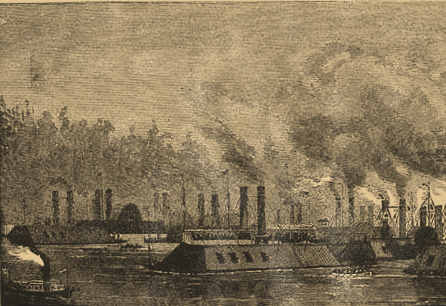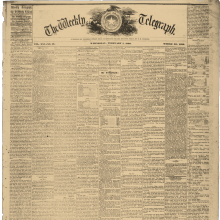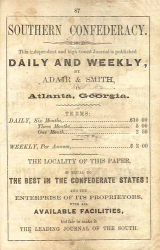MAY 2d.—The awful hour, when thousands of human lives are to be sacrificed in the attempt to wrest this city from the Confederate States, has come again. Now parents, wives, sisters, brothers, and little children, both in the North and in the South, hold their breath in painful expectation. At the last accounts the two armies, yesterday, were drawn up in battle array, facing each other. No water flowed between them, the Northern army being on this side of the Rappahannock. We have no means of knowing their relative numbers; but I suspect Gen. Hooker commands more than 100,000 men, while Gen. Lee’s army, perhaps, does not exceed 55,000 efficients.
Accounts by passengers, and reports from the telegraph operators at the northern end of the line, some ten or twelve miles this side of the armies, indicate that the battle was joined early this morning. Certainly heavy cannonading was heard. Yet nothing important transpired up to 3 P.M., when I left the department, else I should have known it. Still, the battle may be raging, without, as yet, decisive result, and the general may not have leisure to be dictating dispatches.
Yet the heavy artillery may be only the preliminary overture to the desperate engagement; and it seems to me that several days might be spent in manœuvring into position before the shock of arms occurs, which will lay so many heads low in the dust.
But a great battle seems inevitable. All the world knows the fighting qualifications of Gen. Lee, and the brave army he commands; and Gen. Hooker will, of course, make every effort to sustain his reputation as “fighting Joe.” Besides, he commands, for the first time, an army: and knows well that failure to fight, or failure to win, will consign him to the same disgrace of all his predecessors who have hitherto commanded the “Army of the Potomac.”
It is certain that a column of Federal cavalry, yesterday, cut the Central Railroad at Trevillian’s depot, which prevents communication with Gordonsville, if we should desire to send heavy stores thither. And some suppose Lee is manœuvring to get in the rear of Hooker, which would place the enemy between him and Richmond! He could then cut off his supplies, now being drawn by wagons some twenty or thirty miles, and spread alarm even to Washington. But, then, how would it be with Richmond, if Hooker should accept the position, and if the force at Suffolk should advance on the south side of the river, and gun-boats and transports were to come, simultaneously, up the York and James? Has Hooker the genius to conceive such a plan? Suppose it were so, and that he has shipped his supplies from the Potomac—the supplies which Stuart expects to capture—with the desperate resolution, abandoning his base on the Rappahannock, to force a junction with the heavy detachments south and east of this city? A Napoleon would get Richmond—but then Lee might get Washington! Longstreet’s corps is somewhere in transitu between Petersburg and Gordonsville, and would no doubt be ordered here, and it might arrive in time. Our defenses are strong; but at this moment we have only Gen. Wise’s brigade, and a few battalions at the batteries, to defend the capital—some 5000 in all.
This is mere speculation, to be succeeded speedily by awful facts. The inhabitants here do not doubt the result, although there is a feverish anxiety to get intelligence. There is no such thing as fear, in this community, of personal danger, even among the women and children; but there is some alarm by the opulent inhabitants, some of whom, for the sake of their property, would submit to the invader. One thing is pretty certain, Richmond will not fall by assault without costing the lives of 50,000 men, which is about equal to its population in ordinary times.
Well, I am planting potatoes in my little garden, and hope to reap the benefit of them. I pay 50 cts. per quart for seed potatoes, and should be chagrined to find my expenditure of money and labor had been for the benefit of the invader! Yet it may be so; and if it should be, still there are other little gardens to cultivate where we might fly to. We have too broad and too long a territory in the revolted States to be overrun and possessed by the troops of the United States.
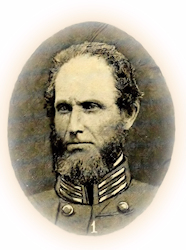

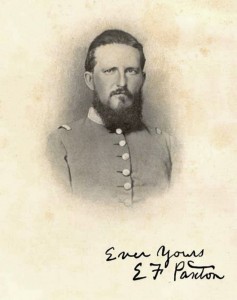 Paxton was killed, Gen’l Jackson severely and Gen’l Heath and D. H. Hill slightly wounded.
Paxton was killed, Gen’l Jackson severely and Gen’l Heath and D. H. Hill slightly wounded.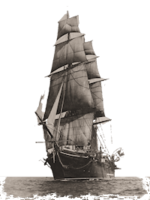




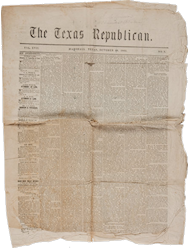
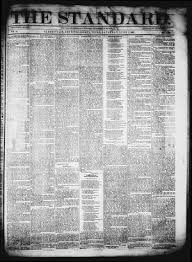
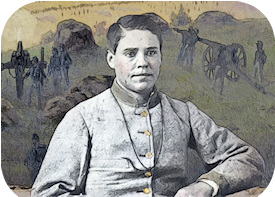


 miles over dusty roads and through a hilly and broken country. Although the boys were tired, their minds were diverted with the scenery of a new State. After crossing the great Mississippi, we bade farewell to Louisiana and its alligators, and are now inhaling the fragrance and delightful odors of Mississippi flowers. Arriving near Port Gibson about dark, found that the advance of McClernand’s corps had defeated the enemy, who had marched out from Vicksburg to check our army. The fight was quite spirited, and the rebels hotly and bravely contested every foot of ground, but they were overpowered, as they will be in every engagement they have with us. Having only two day’ rations in our haversacks, guess we will have to eat rather sparingly of them, for our wagon train is not on the road. Should rations run short, we will have to forage off the country; but even the supplies from that source will not feed Grant’s large army. We were well satisfied, however, that the stars and stripes were victorious, in this battle, without our assistance. We did not smell the battle afar off, but heard cannonading through the day, and fully expected to take a hand in it. When we stopped, as we supposed, for the night, our Colonel drew the regiment into line, and said Gen. McPherson had asked him if his regiment was too wearied to follow the retreating enemy. When the question was put to the men, every one wanted to go, and started on the trail with the swiftness of fresh troops, marching as rapidly as possible until 10 o’clock, then camped in a ravine for the night. During this rapid movement, we did some skirmishing. The Confederate army had retreated, and we made the tail of it fly over the road pretty lively.
miles over dusty roads and through a hilly and broken country. Although the boys were tired, their minds were diverted with the scenery of a new State. After crossing the great Mississippi, we bade farewell to Louisiana and its alligators, and are now inhaling the fragrance and delightful odors of Mississippi flowers. Arriving near Port Gibson about dark, found that the advance of McClernand’s corps had defeated the enemy, who had marched out from Vicksburg to check our army. The fight was quite spirited, and the rebels hotly and bravely contested every foot of ground, but they were overpowered, as they will be in every engagement they have with us. Having only two day’ rations in our haversacks, guess we will have to eat rather sparingly of them, for our wagon train is not on the road. Should rations run short, we will have to forage off the country; but even the supplies from that source will not feed Grant’s large army. We were well satisfied, however, that the stars and stripes were victorious, in this battle, without our assistance. We did not smell the battle afar off, but heard cannonading through the day, and fully expected to take a hand in it. When we stopped, as we supposed, for the night, our Colonel drew the regiment into line, and said Gen. McPherson had asked him if his regiment was too wearied to follow the retreating enemy. When the question was put to the men, every one wanted to go, and started on the trail with the swiftness of fresh troops, marching as rapidly as possible until 10 o’clock, then camped in a ravine for the night. During this rapid movement, we did some skirmishing. The Confederate army had retreated, and we made the tail of it fly over the road pretty lively.